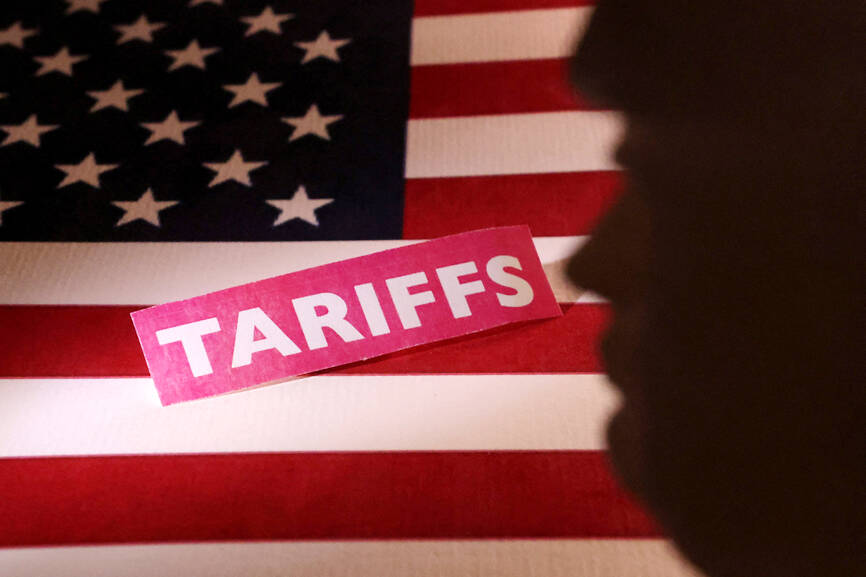Democratic Progressive Party (DPP) Legislator Wang Ting-yu (王定宇) yesterday urged opposition parties not to put extra stress on Taiwanese tariff negotiators with their additional demands, adding that the talks must be kept confidential to prevent other countries from learning of the deal.
The White House on Thursday set Taiwan’s tariff rate at 20 percent, down from the 32 percent it announced in April, following several rounds of negotiations between Taipei and Washington.
The Taiwan People’s Party (TPP) caucus on Friday said it would convene a cross-caucus meeting this week to discuss the procedure for inviting the premier and other heads of ministries to deliver an impact assessment report on Taiwan-US tariff negotiations within a month.

Photo: Reuters
The government says it cannot disclose that information to the public, citing confidentiality agreements, but they are evading legislative oversight and leaving industries out in the cold, the TPP caucus said, urging President William Lai’s (賴清德) administration to “face the opposition and be honest with the public.”
When the DPP was the opposition 2010, it criticized the Chinese Nationalist Party (KMT)-led government for not being transparent during discussions with China on the Economic Cooperation Framework Agreement, National Policy Foundation deputy CEO Ling Tao (凌濤) said, calling on the DPP not to apply double standards.
However, Wang said that in the government’s defense, the results of the tariff talks would be reported to the legislature when needed, and that all administrative procedures would be observed.
The public would see that the Legislative Yuan can effectively provide oversight of the government, he added.
Commenting on independent Legislator May Chin’s (高金素梅) demand for an item-by-item review of all trade talk results and the legislature’s decision, Wang said it should be submitted to the public for ratification via referendum.
The constant creation of issues and conflicts during the trade talks is only putting more pressure on the teams leading the discussions and making their job more difficult, he said.
Additional reporting by CNA

The first global hotel Keys Selection by the Michelin Guide includes four hotels in Taiwan, Michelin announced yesterday. All four received the “Michelin One Key,” indicating guests are to experience a “very special stay” at any of the locations as the establishments are “a true gem with personality. Service always goes the extra mile, and the hotel provides much more than others in its price range.” Of the four hotels, three are located in Taipei and one in Taichung. In Taipei, the One Key accolades were awarded to the Capella Taipei, Kimpton Da An Taipei and Mandarin Oriental Taipei. Capella Taipei was described by

The Taichung District Court yesterday confirmed its final ruling that the marriage between teenage heir Lai (賴) and a man surnamed Hsia (夏) was legally invalid, preventing Hsia from inheriting Lai’s NT$500 million (US$16.37 million) estate. The court confirmed that Hsia chose not to appeal the civil judgement after the court handed down its ruling in June, making the decision final. In the June ruling, the court said that Lai, 18, and Hsia, 26, showed “no mutual admiration before the marriage” and that their interactions were “distant and unfamiliar.” The judge concluded that the couple lacked the “true intention of

EVA Airways today confirmed the death of a flight attendant on Saturday upon their return to Taiwan and said an internal investigation has been launched, as criticism mounted over a social media post accusing the airline of failing to offer sufficient employee protections. According to the post, the flight attendant complained of feeling sick on board a flight, but was unable to take sick leave or access medical care. The crew member allegedly did not receive assistance from the chief purser, who failed to heed their requests for medical attention or call an ambulance once the flight landed, the post said. As sick

INDUSTRY: Beijing’s latest export measures go beyond targeting the US and would likely affect any country that uses Chinese rare earths or related tech, an academic said Taiwanese industries could face significant disruption from China’s newly tightened export controls on rare earth elements, as much of Taiwan’s supply indirectly depends on Chinese materials processed in Japan, a local expert said yesterday. Kristy Hsu (徐遵慈), director of the Taiwan ASEAN Studies Center at the Chung-Hua Institution for Economic Research, said that China’s latest export measures go far beyond targeting the US and would likely affect any country that uses Chinese rare earths or related technologies. With Japan and Southeast Asian countries among those expected to be hit, Taiwan could feel the impact through its reliance on Japanese-made semi-finished products and